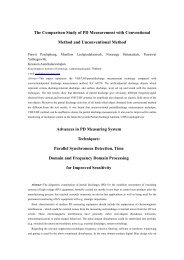New Modes of GPCR Signalling
New Modes of GPCR Signalling
New Modes of GPCR Signalling
You also want an ePaper? Increase the reach of your titles
YUMPU automatically turns print PDFs into web optimized ePapers that Google loves.
Inhibition <strong>of</strong> Protein Phosphatase 2A Activity Plays a Key Role for Normal<br />
Human Cells to Acquire TRAIL-Sensitive Phenotype during Tumorigenesis<br />
Yansheng Li1, Yajun Xiao1, Xuegang Wang1, Shaoyong Chen2, Siping Zeng1, Changshuai<br />
Shao1, Xiaohui Qian1,Rong Wang1, Xuanyu Chen1, Quansheng Du3, Aria F. Olumi4,<br />
Hongmei Yang5, Xiaoping Zhang1§<br />
1. Department <strong>of</strong> Urology, Union Hospital, Tongji Medical School, Huazhong University <strong>of</strong><br />
Science and Technology, Wuhan 430022, China, 2.Cancer Biology Program,<br />
Hematology-Oncology Division, Department <strong>of</strong> Medicine, Beth Israel Deaconess Medical<br />
Center, Harvard Medical School, Boston, Massachusetts 02215, USA 3.Cancer Center,<br />
Medical College <strong>of</strong> Georgia, Augusta, GA 30912, USA4. Department <strong>of</strong> Urology,<br />
Massachusetts General Hospital, Harvard Medical School, Boston, MA 02114, USA.<br />
5.Department <strong>of</strong> Pathogen Biology, Tongji Medical School, Huazhong University <strong>of</strong> Science<br />
and Technology, Wuhan 430030, China<br />
Aim: Tumor necrosis factor–related apoptosis-inducing ligand (TRAIL) is a promising<br />
anticancer agent because it induces apoptosis in most cancer cells but spares normal cells. The<br />
aim <strong>of</strong> the study is to determine how normal human cells acquire TRAIL-sensitive phenotype<br />
during the process <strong>of</strong> malignant transformation. Methods: An experimental cell system was<br />
developed by sequential introduction <strong>of</strong> hTERT, SV40 LT, SV40 ST and H-Ras into normal<br />
human prostatic epithelial cells. Then these cells were treated with TRAIL by using MTT assay.<br />
After determining which cells became sensitive to TRAIL, the underlying mechanisms were<br />
explored. Results: For the first time, we demonstrate that introduction <strong>of</strong> SV40 ST into cells<br />
changes TRAIL phenotype from TRAIL-resistant to TRAIL-sensitive, activity inhibition <strong>of</strong> the<br />
protein phosphatase 2A (PP2A) either by SV40 ST or okadaic acid (OA) sensitizes normal<br />
human prostatic epithelial cells to TRAIL-induced apoptosis during premalignant period <strong>of</strong><br />
tumorigenesis and tumor suppressor gene PP2A may exert its antiapoptotic by negatively<br />
regulating c-Fos/AP-1. In addition, low-dose OA treatment sensitizes TRAIL-resistant cancer<br />
cells to TRAIL, which indicates PP2A inhibitors such as OA can potentially used as an<br />
enhancer <strong>of</strong> apoptosis induced by TRAIL or TRAIL-like agents. Conclusion: Inhibition <strong>of</strong><br />
PP2A activity is a key step for normal human cells to acquire TRAIL-sensitive phenotype<br />
during tumorigenesis, and lower PP2A activity might be a major determinant for cancer cells to<br />
be sensitive to TRAIL-induced apoptosis.<br />
Key Words: TRAIL, the protein phosphatase 2A (PP2A), Apoptosis, SV40 ST, Okadaic acid<br />
(OA)<br />
Grant Support: the National Natural Science Foundation <strong>of</strong> China (NSFC) (30572139),<br />
(30872924) and Program for <strong>New</strong> Century Excellent Talents in University from Department <strong>of</strong><br />
Education <strong>of</strong> China (NCET-08-0223) to XZ<br />
§ Corresponding Authors:<br />
Xiaoping Zhang:1277 Jiefang Dadao,Wuhan 430022,Hubei Province,China, Department <strong>of</strong><br />
Urology, Union Hospital, Email: xiaoping.zhang2008@gmail.com












